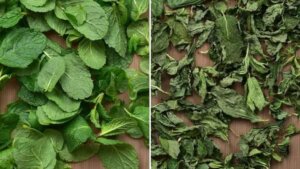The Simplest Way to Dry Mint Leaves at Home

Why Dry Mint?
Drying mint helps to concentrate its flavor and extend its shelf life, making it available for use long after the growing season has ended. Dried mint leaves can be used in teas, cooking, and homemade remedies, offering a burst of flavor and a fresh scent in each use.
1. Harvesting: The best time to harvest mint leaves is just before the plant starts to flower, when the leaves are rich in oils and flavor. Choose a dry, sunny morning to pick the leaves. This ensures they are at their peak and not damp from evening dew.
2. Preparing the Leaves: Gently wash the mint leaves under cold water to remove any dirt or bugs. Pat them dry with a clean towel or let them air dry on paper towels. Make sure the leaves are completely dry to avoid any mold during the drying process.
3. Air Drying: This is the simplest and most energy-efficient method to dry mint.
- Method: Tie the mint stems together with string and hang them upside down in a warm, dry, and well-ventilated area out of direct sunlight. A dark pantry or cupboard works well.
- Duration: It typically takes about 1-2 weeks for the leaves to fully dry. The leaves should feel crisp and crumble easily when they are ready.
4. Oven Drying: If you’re short on time, oven drying is a faster method.
- Method: Preheat your oven to its lowest setting (around 180°F or lower). Spread the mint leaves on a baking sheet in a single layer. Place the sheet in the oven, leaving the door slightly open to allow moisture to escape.
- Duration: Check the leaves every 10-15 minutes. Typically, it takes about 1-2 hours for them to dry completely. Be careful not to burn the leaves.
5. Storing Dried Mint: Once dried, crumble the leaves and store them in an airtight container. Keep the container in a cool, dark place to preserve the flavor and freshness for up to a year.
Using Dried Mint
Dried mint can be used in a variety of ways:
-
- Teas: Steep a teaspoon of dried mint in boiling water for a refreshing herbal tea.
- Cooking: Add dried mint to dishes like lamb, salads, or stews for a touch of freshness.
- Homemade Remedies: Use it in homemade toothpaste or mouthwash for its antibacterial properties.
